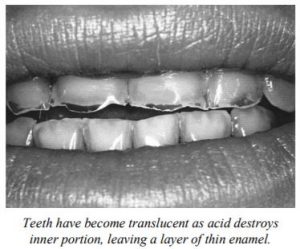Did You Know?
 Dietary habits can and do play a role in oral health. Everyone has heard from their dentist that eating too much sugar can lead to cavities, but did you know that high intake of acidic “diet” foods can have an equally devastating effect on your teeth?
Dietary habits can and do play a role in oral health. Everyone has heard from their dentist that eating too much sugar can lead to cavities, but did you know that high intake of acidic “diet” foods can have an equally devastating effect on your teeth?
In fact, while up to 89% of bulimic patients show signs of the tooth erosion usually associated with regurgitation, some studies have found similar prevalence rates in patients with highly restrictive dietary habits.
The harmful habits and nutritional deficiencies that often accompany disordered eating can have severe consequences on one’s dental health. It is often the pain and discomfort associated with dental complications that causes individuals with eating disorders to seek treatment.
Signs and Symptoms

- Loss of tissue and erosive lesions on the surface of teeth due to the effects of acid. These lesions can appear as early as 6 months from the start of the problem.
- Changes in the color, shape, and length of teeth. Teeth can become brittle, translucent, and weak.
- Increased sensitivity to temperature. In extreme cases the pulp can be exposed and cause infection, discoloration, or even pulp death.
- Enlargement of the salivary glands, dry mouth, and reddened, dry, cracked lips.
- Tooth decay, which can actually be aggravated by extensive tooth brushing or rinsing following vomiting.
- Unprovoked, spontaneous pain within a particular tooth.
Changes in the mouth are often times the first physical signs of an eating disorder. If you are experiencing any of these symptoms, talk with your dentist about ways to care for your teeth and mouth. There are methods for improving your oral health while you are seeking help to change harmful eating habits.
Copyright 2005 National Eating Disorders Association. Permission is granted to copy and print materials for educational purposes only.

